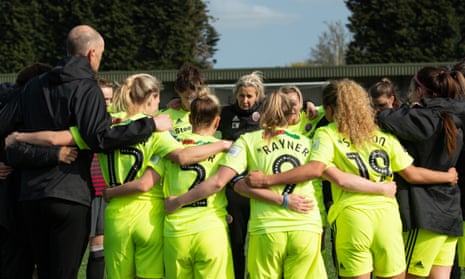Carla Ward’s Sheffield United face Aston Villa on the opening day of the Women’s Championship on Sunday but Villa are a very different beast to the one United finished eight points above last year.
Villa have stepped up their investment, taking on full-time players and shaping themselves for a promotion push. United, on a much smaller budget, have also strengthened. Four of their eight signings have come from WSL football, while Naomi Hartley joins from Championship champions Manchester United, who were promoted together with Tottenham. Perhaps the biggest change, though, is in their manager.
After a season as the player-assistant manager, having been recruited from Sheffield FC, the 35-year-old Ward was handed the reins after one season, charged with leading the club in a two-tier jump – having been successful in their application to join the restructured second division – and into semi-professionalism. It was a colossal leap, and a not straightforward campaign on the pitch, with stuttering results early on, and off it, with the investigation into the accusation of racism against Sophie Jones by Tottenham’s Renée Hector.
The hardest part for Ward was the step away from the dressing room. “The transition from player to manager was massive because I’ve gone from the banter in the changing room with the girls, and I was probably the centre of it,” she says. “Then restricting yourself, pulling yourself back and not getting involved in that banter and acting the clown was tough early on.”
The step into management also meant some tough decisions had to be made about the futures of teammates. “Signing players, releasing players, it was tough, I was still friends with them, I still had them on Snapchat and things like that. You stop going ‘all right mate’ and you start saying ‘right, you’.”
And, despite being on the touchline, Ward sometimes still thinks she could be making a difference on the pitch: “Sometimes I think ‘why’s she not seen that pass? How has she not seen that pass?” she laughs.
In addition, although far from alien to her as a player in that environment, the logistical troubles of coordinating part-time players stretched the squad close to breaking point when an early evening tie at Manchester City meant some working players could not play.
It caused a small media storm – something which amused Ward. “I kept laughing about it,” she says. “I saw it as an opportunity for the youngsters. I mean, we swapped the team about two minutes before kick-off because someone hadn’t arrived. But you know what? Sometimes you just have to take it on the chin. I know people work and people have jobs. It’s a big sacrifice. I don’t think the FA appreciate the sacrifice that especially Championship players make.
“I’ve got players who live two and a half hours away, they travel three nights a week and a weekend, and their wage doesn’t even cover their petrol. I don’t think anyone really gets that. It’s astounding, and we’re talking about the second-highest tier in women’s football. So there’s still a lot of work to do.”
It is a problem she is grappling with right now. “We played Everton in pre-season and we’ve still got a lot of players away. People go ‘what do you mean you’ve got players away?’ Well, they have a life. We don’t have enough money to dictate that they can’t go away. And I’m a big believer everybody needs a break. And if they’re a teacher, and they’ve only got six week holiday, and that’s in our pre-season, then for me, they’ve got to go away and fresh enough, otherwise, they’re just going to blow out.”
After Christmas last year, three defeats, to title-contending Tottenham, Charlton and Manchester United, came and were not unexpected but then the team went unbeaten in seven games to the end of the season.
Standards are high, though, and fifth was not what they wanted. “It ended up being quite a successful year, but we weren’t happy with it. I think when we look around, fifth, it was good in terms of what we had. The fact we are unhappy with that shows what the squad’s about. We’ve got probably the lowest budget in the league,” Ward says. “But players are walking through the door and turning down offers from other clubs because they see what we are doing. Although we’re a part-time outfit we’ve got the full-time model. They wear the same kit as the men and they get on the same bus as the men.
“Somebody actually said to me last week ‘Jesus Christ, you must have some money.’ And I laughed. I wish I did. You would not believe how little we have got financially.”

Comments (…)
Sign in or create your Guardian account to join the discussion